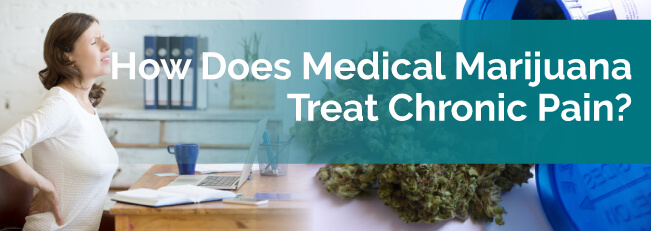
There are many possible causes of chronic pain, from injuries that have failed to heal properly to illnesses that cause patients to be wracked with discomfort. Whatever the cause of your chronic pain, the common factor for all patients is the desire to live their daily lives unhindered. Chronic and debilitating pain makes it difficult to do even the simplest tasks. It also affects patient’s work, relationships and psyche, often causing depression or anxiety.
The most common treatments for severe pain are prescription opioids and other pain medications. However, these come with an extensive list of adverse side effects, including nausea and constipation. Worst of all, dependence and addiction to these drugs are quite common. In extreme cases, bad reactions and misuse lead to death.
Doctors and patients now seek better treatment options for chronic pain. The legalization of medical marijuana in many states has come at the perfect time. Prescription opioid use is on the rise, and medical marijuana is a safer and less addictive treatment.
More and more research studies and anecdotal evidence is proving medical marijuana is a potent pain reliever. Chronic pain is the number one medical condition treated by cannabis medications. For decades, users have been self-medicating with the plant. This has led the medical community seeking the truth.
Are there actual pain relieving properties in marijuana? The answer is yes. Medical marijuana has been proven to be an effective pain medication for chronic pain associated with injury and many medical conditions. Patients with the following conditions have found effective relief from painful symptoms:
Pain is the body’s way of telling us that something’s not right, like an alarm system blaring within us. But it’s not always easy to tell what the cause is. Even if the root problem is treated, pain can continue. These residual feelings of pain can develop into what we call chronic pain.
Medical marijuana is an effective pain treatment because of the natural compounds contained in it known as cannabinoids. These work with our body’s receptors. The endocannabinoid system is the key to understanding our body’s reaction to cannabis. This system has receptors throughout our body — in the immune system, in tissues and organs and throughout our nervous system. It acts as a bridge between our body and our mind.
When we have an injury or illness, our body doesn’t work properly. The cannabinoids found in marijuana work with the endocannabinoid receptors to block pain and bring effective relief.
Because marijuana is still federally banned in the United States, there’s limited research on cannabis as a pain treatment. The studies that have been conducted and the anecdotal evidence all point in the same direction — marijuana has proven analgesic properties. Studies in countries where marijuana isn’t illegal show cannabis has medicinal value as a pain reliever.
Many states throughout the U.S. are now allowing patients to apply for a medical marijuana card if they struggle with chronic pain. This trend is bringing hope to countless individuals seeking better pain management.
The first step to getting your card is making an appointment with a marijuana doctor to see if you qualify and ask them to oversee your medical cannabis treatment plan.